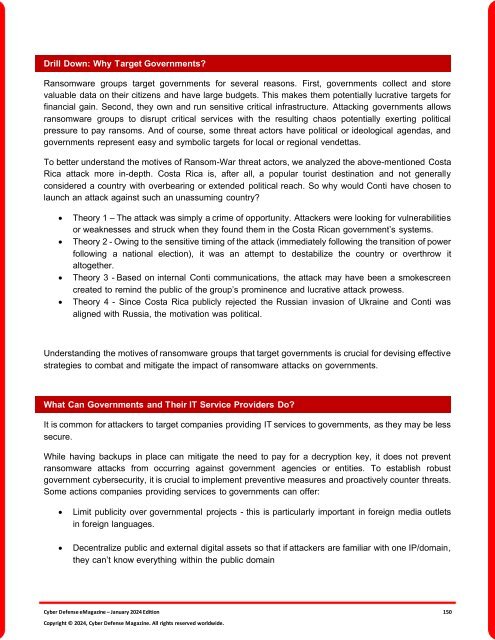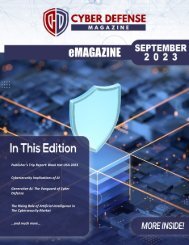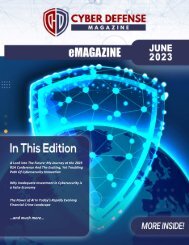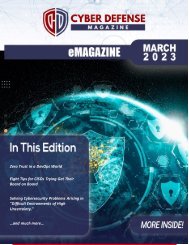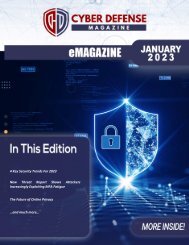The Cyber Defense eMagazine January Edition for 2024
Cyber Defense eMagazine January Edition for 2024 #CDM #CYBERDEFENSEMAG @CyberDefenseMag by @Miliefsky a world-renowned cyber security expert and the Publisher of Cyber Defense Magazine as part of the Cyber Defense Media Group as well as Yan Ross, Editor-in-Chief and many more writers, partners and supporters who make this an awesome publication! 201 page January Edition fully packed with some of our best content. Thank you all and to our readers! OSINT ROCKS! #CDM #CDMG #OSINT #CYBERSECURITY #INFOSEC #BEST #PRACTICES #TIPS #TECHNIQUES
Cyber Defense eMagazine January Edition for 2024 #CDM #CYBERDEFENSEMAG @CyberDefenseMag by @Miliefsky a world-renowned cyber security expert and the Publisher of Cyber Defense Magazine as part of the Cyber Defense Media Group as well as Yan Ross, Editor-in-Chief and many more writers, partners and supporters who make this an awesome publication! 201 page January Edition fully packed with some of our best content. Thank you all and to our readers! OSINT ROCKS! #CDM #CDMG #OSINT #CYBERSECURITY #INFOSEC #BEST #PRACTICES #TIPS #TECHNIQUES
You also want an ePaper? Increase the reach of your titles
YUMPU automatically turns print PDFs into web optimized ePapers that Google loves.
Drill Down: Why Target Governments?<br />
Ransomware groups target governments <strong>for</strong> several reasons. First, governments collect and store<br />
valuable data on their citizens and have large budgets. This makes them potentially lucrative targets <strong>for</strong><br />
financial gain. Second, they own and run sensitive critical infrastructure. Attacking governments allows<br />
ransomware groups to disrupt critical services with the resulting chaos potentially exerting political<br />
pressure to pay ransoms. And of course, some threat actors have political or ideological agendas, and<br />
governments represent easy and symbolic targets <strong>for</strong> local or regional vendettas.<br />
To better understand the motives of Ransom-War threat actors, we analyzed the above-mentioned Costa<br />
Rica attack more in-depth. Costa Rica is, after all, a popular tourist destination and not generally<br />
considered a country with overbearing or extended political reach. So why would Conti have chosen to<br />
launch an attack against such an unassuming country?<br />
• <strong>The</strong>ory 1 – <strong>The</strong> attack was simply a crime of opportunity. Attackers were looking <strong>for</strong> vulnerabilities<br />
or weaknesses and struck when they found them in the Costa Rican government’s systems.<br />
• <strong>The</strong>ory 2 - Owing to the sensitive timing of the attack (immediately following the transition of power<br />
following a national election), it was an attempt to destabilize the country or overthrow it<br />
altogether.<br />
• <strong>The</strong>ory 3 - Based on internal Conti communications, the attack may have been a smokescreen<br />
created to remind the public of the group’s prominence and lucrative attack prowess.<br />
• <strong>The</strong>ory 4 - Since Costa Rica publicly rejected the Russian invasion of Ukraine and Conti was<br />
aligned with Russia, the motivation was political.<br />
Understanding the motives of ransomware groups that target governments is crucial <strong>for</strong> devising effective<br />
strategies to combat and mitigate the impact of ransomware attacks on governments.<br />
What Can Governments and <strong>The</strong>ir IT Service Providers Do?<br />
It is common <strong>for</strong> attackers to target companies providing IT services to governments, as they may be less<br />
secure.<br />
While having backups in place can mitigate the need to pay <strong>for</strong> a decryption key, it does not prevent<br />
ransomware attacks from occurring against government agencies or entities. To establish robust<br />
government cybersecurity, it is crucial to implement preventive measures and proactively counter threats.<br />
Some actions companies providing services to governments can offer:<br />
• Limit publicity over governmental projects - this is particularly important in <strong>for</strong>eign media outlets<br />
in <strong>for</strong>eign languages.<br />
• Decentralize public and external digital assets so that if attackers are familiar with one IP/domain,<br />
they can’t know everything within the public domain<br />
<strong>Cyber</strong> <strong>Defense</strong> <strong>eMagazine</strong> – <strong>January</strong> <strong>2024</strong> <strong>Edition</strong> 150<br />
Copyright © <strong>2024</strong>, <strong>Cyber</strong> <strong>Defense</strong> Magazine. All rights reserved worldwide.


